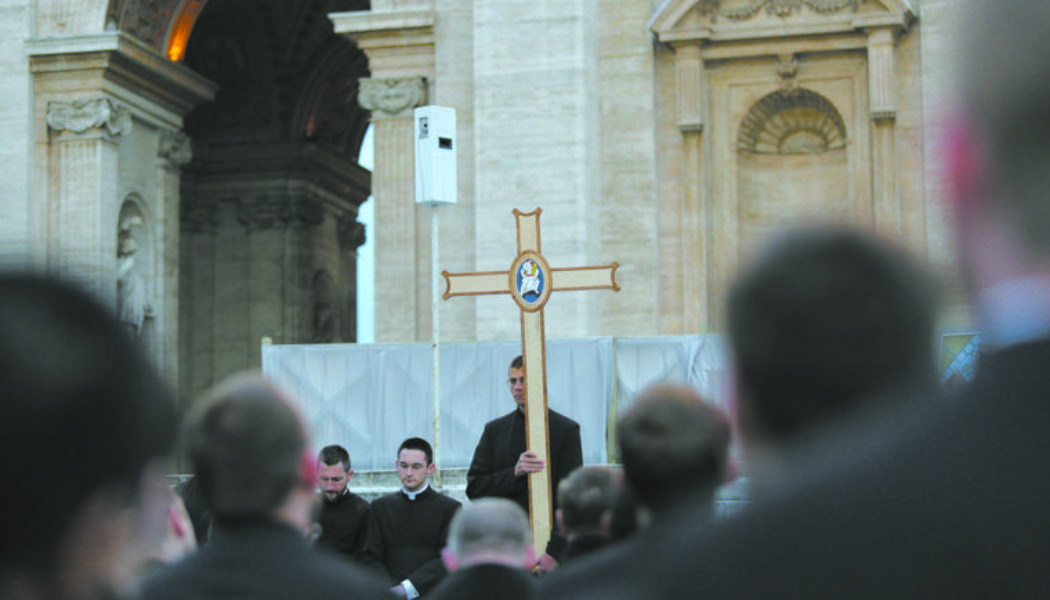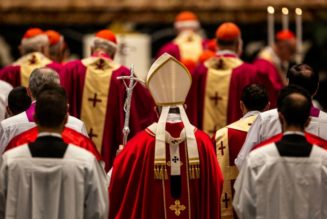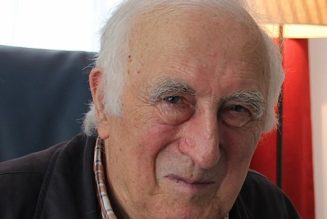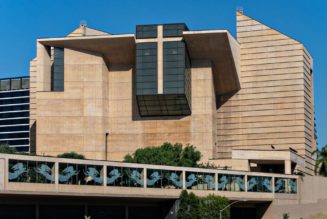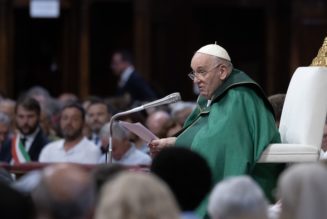
With a rise in social acceptance of “gender-reassignment” procedures, some U.S. seminaries have already been forced to deal with applicants who identify as men but are biologically women — and bishops and seminary formators have been warned to prepare for a potential increase in the number of such cases.
News of the need for additional screening broke late September after Archbishop Jerome Listecki of Milwaukee alerted U.S. bishops of instances in which “a woman living under a transgendered identity” had been admitted for seminary formation, according to a memorandum published by a Sept. 29 CNA report.
Archbishop Listecki urged other U.S. bishops to take steps to ensure that applicants are biologically male — a requirement for valid ordination — after an undisclosed number of individuals who were admitted to seminary or houses of formation have been discovered to have been born female and living under a male identity, unbeknownst to their formators. At least one case involved a woman who had falsified her sacramental records, the memorandum advised.
This fall, Catholic News Agency and the Register investigated the cases of two individuals who were identified in public records as females until after they graduated from high school who subsequently “transitioned” to male identities and later gained admission to U.S. Catholic seminaries. Neither of these persons is still present in the seminaries into which they were admitted.
In light of these events, the Register spoke with experts in areas of seminary formation about appropriate screening processes that could be added to what is already in place.
“The primary responsibility for overseeing the admissions process to seminary belongs to the local bishop,” a USCCB representative told the Register.
Meanwhile, the diocese from which the seminarian is sent and the seminary itself have “separate screening procedures,” Anthony Lilles, academic dean at St. Patrick’s Seminary and University in Menlo Park, California, told the Register. That said, both are guided by the USCCB’s Program of Priestly Formation, which “requires consistent readiness thresholds and the observance of the same norms,” he added.
In screening for potential transgender applicants, Lilles said he recommends “scrutiny of the baptismal certificate,” while acknowledging the limitations of such documentation. “It’s still regarded as a tool, but as we’ve seen more recently, even that tool can be falsified,” he said. “It doesn’t always have the information that we need.”
Along with assessing sacramental records, psychological and medical evaluations and an autobiography written by the applicant are included among the guidelines listed in the Program of Priestly Formation.
The Church firmly holds that only a baptized male can be validly ordained to holy orders, and, as canonist Catherine Godfrey-Howell told the Register, there is no precedent in Catholic teaching that can be called upon to distinguish between biological sex and gender identity in any legal inquiry. Therefore, no canonical ground exists upon which a woman could seek entry to seminary on the basis of a belief that her gender identity is male.
“There is no interpretation of man and woman such that one would be required to say ‘biological man’ or ‘biological woman,’” Godfrey-Howell explained. “Canonical language serves the overlooked role of preserving a correct rendering of Christian anthropology, promulgating undiminishable natural law.”
“Because there is no way to make the argument for the broad interpretation of ‘man’ or ‘woman,’ the question of whether a woman who identifies as a man can be a priest is not viable at all in the juridical sphere,” she said. “It remains, ‘Why can’t a woman be a priest?’ and in the spheres of theology proper.”
“There is no room for introducing ‘trans’ terminology or notions without assuming that this is indeed a reality confirmed by other theological disciplines,” she said.
There is a precedent in the Church for the use of medicine and psychology in vetting applicants to seminary. As stated in a 2008 Vatican document on the use of psychology in the admissions process, “the Church has the right to verify the suitability of future priests, including by means of recourse to medical and psychological science.”
Psychological evaluations are conducted to ensure that the candidate for seminary is psychologically and emotionally equipped to freely discern a vocation to the celibate priesthood and possesses the stamina to confront the demands of the priesthood. Indeed, “amentia” (intellectual disability) and “psychic [mental] illness” are included as impediments for ordination, according to canon law.
“The claim of being trans alerts one more to the fact of being ‘disintegrated’ in psyche, such that judgments of a certain nature are impossible,” Godfrey-Howell said. “Vocational discernment would be included in this.”
Timothy Lock, director of psychological services at St. Joseph’s Seminary in Yonkers, New York, told the Register that an applicant must provide in writing “previous, explicit, informed and free consent,” at which point “the psychologist has proper permission to discuss the results of the evaluation with the seminary.”
“The Church should know the individual who is applying,” Lock said. “The seminary is in the business of forming men into priests. In order to do this, they want to know as much as possible about the man.”
Bearing in mind the highly personal details that are examined during the vetting process, Lock stressed “that the Vatican is concerned about the applicant’s privacy and the need for the applicant to preserve his good reputation.”
While considering other potential options for assessment of applicants, however, Lock emphasized the importance of waiting “for formal guidance from the bishops of the USCCB regarding how to proceed with the seminary admission process and issues regarding gender identity and those who have transitioned from female to male.”
In addition to other assessment procedures, a simple medical evaluation, which is a standard part of seminary screening, should reveal a person’s biological sex 99.8% of the time, says Dr. Patrick Lappert, a board-certified plastic surgeon and deacon for the Diocese of Birmingham, Alabama.
“As a plastic surgeon of 30-odd years, I can tell you, some of the work that we do is really compelling,” he said, but it is easy to discern if a woman has had genital surgery to present as male.
He added that such examinations are a normal part of medical screenings, and the process “doesn’t have to be degrading.” If, for some reason, such an examination isn’t enough to determine the person’s sex, a DNA test would reveal the biological reality, Deacon Lappert said, echoing the recommendations by Archbishop Listecki in September’s memorandum to bishops.
Being genetically male is not the only factor in determining suitability for the priesthood from the standpoint of biological sex, however.
For instance, there are complex medical cases of genetic males who — through no fault of their own — exhibit ambiguous genitalia or female secondary sex characteristics as the result of a sexual development disorder, which could impact a man’s suitability for ordination.
Deacon Lappert cited as an example the extremely rare androgen insensitivity disorder, in which a genetic male experiences sensitivity to male hormones, leading to the outward appearance of being female and sterility.
“They have a huge impediment to life as a man, so that would be an impediment to ordination for the same reason,” the deacon explained.
Seminary formators say that the issue of biological women living under male identities seeking admission is reflective of the broader problems regarding sexuality in contemporary cultures.
While young applicants to seminary generally have good intentions when they present themselves for formation, seminaries are aware of the profound effects that the hyper-sexualization of today’s culture has had on their identity and sense of self.
“Our culture’s so oversexualized that there are a lot of wounds of people’s sexuality when they come to seminary,” Lilles said. “Even if they’ve been living chastely for two to three years” prior to entering seminary, “it’s likely that they’ve struggled with things like internet pornography or same-sex attractions or disordered relationships of all different kinds.”
“And we’re never surprised by sin,” he said, adding that it is the role of seminary formators to “accompany the men out of brokenness” so that they in turn can console the faithful.
Join Our Telegram Group : Salvation & Prosperity
